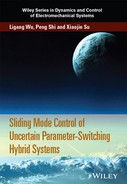Preface
Since the 1950s, sliding mode control (SMC) has been recognized as an effective robust control strategy for nonlinear systems and incompletely modeled systems. In the past two decades, SMC has been successfully applied to a wide variety of real world applications such as robot manipulators, aircraft, underwater vehicles, spacecraft, flexible space structures, electrical motors, power systems, and automotive engines. Basically, the idea of SMC is to utilize a discontinuous control to force the system state trajectories to some predefined sliding surfaces on which the system has desired properties such as stability, disturbance rejection capability, and tracking ability. Many important results have been reported for this kind of control strategy. However, when the controlled plants are uncertain parameter-switching hybrid systems including parameter-switching (Markovian jump or arbitrary switching), state-delay, stochastic perturbation, and singularly perturbed terms, the common SMC methodologies cannot meet the requirements.
It is known that the SMC of uncertain parameter-switching hybrid systems is much more complicated because sliding mode controllers must be designed so that not only is the sliding surface robustly reachable, but also the sliding mode dynamics can converge the system’s equilibrium automatically by choosing a suitable switching function. This book aims to present up-to-date research developments and novel methodologies on SMC of uncertain parameter-switching hybrid systems in a unified matrix inequality setting. The considered uncertain parameter-switching hybrid systems include Markovian switching hybrid systems, switched state-delayed hybrid systems, and switched stochastic hybrid systems. These new methodologies provide a framework for stability and performance analysis, SMC design, and state estimation for these classes of systems. Solutions to the design problems are presented in terms of linear matrix inequalities (LMIs). In this book, a large number of references are provided for researchers who wish to explore the area of SMC of uncertain parameter-switching hybrid systems, and the main contents of the book are also suitable for a one-semester graduate course.
In this book, we present new SMC methodologies for uncertain parameter-switching hybrid systems. The systems under consideration include Markovian jump systems, singular systems, switched hybrid systems, stochastic systems, and time-delay systems.
The content of this book are divided into three parts. The first part is focused on SMC of Markovian jump singular systems. Some necessary and sufficient conditions are derived for the stochastic stability, stochastic admissibility, and optimal performances by developing new techniques for the considered Markovian jump singular systems. Then a set of new SMC methodologies are proposed, based on the analysis results. The main contents are as follows: Chapter 2 is concerned with the state estimation and SMC of singular Markovian switching systems; Chapter 3 studies the optimal SMC problem for singular Markovian switching systems with time delay; and Chapter 4 establishes the integral SMC method for singular Markovian switching stochastic systems.
In the second part, the problem of SMC of switched state-delayed hybrid systems is investigated. A unified approach of the piecewise Lyapunov function combining with the average dwell time technique is developed for analysis and synthesis of the considered systems. By this approach, some sufficient conditions are established for the stability and synthesis of the switched state-delayed hybrid system. More importantly, a set of SMC methodologies under a unique framework are proposed for the considered hybrid systems. The main contents of this part are as follows: Chapter 5 is devoted to the stability analysis and the stabilization problems for switched state-delayed hybrid systems; Chapter 6 investigates the optimal dynamic output feedback (DOF) control of switched state-delayed hybrid systems; and Chapters 7 and 8 study the SMC of continuous- and discrete-time switched state-delayed hybrid systems, respectively.
In the third part, the parallel theories and techniques developed in the second part are extended to deal with switched stochastic hybrid systems. The main contents include the following: Chapters 9 and 10 are concerned with the control of switched stochastic hybrid systems for continuous- and discrete-time cases, respectively; Chapter 11 studies the observer-based SMC of switched stochastic hybrid systems; and Chapter 12 focuses on the dissipativity-based SMC of switched stochastic hybrid systems.
This book is a research monograph whose intended audience is graduate and postgraduate students, academics, scientists and engineers who are working in the field.
Ligang Wu
Harbin, China
Peng Shi
Melbourne, Australia
Xiaojie Su
Chongqing, China
December 2013
